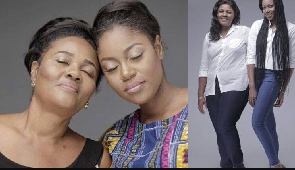In what looks like a family pattern, Yvonne Nelson has expressed in parts of her book that her mother grew up not knowing who her real father was.
According to Yvonne, her mother bore the surname of a certain guardian, who was a father figure in her life, but then the treatment she received from the man’s wife compelled her to move out at an early stage.
“My mother had grown up not knowing her father. Or rather, she knew the wrong father. She bore the surname Glover-Addy. She told me how hellish life was in the house of Mr. Glover-Addy. The man’s wife, she told me, couldn’t stand her. She felt it was beyond the usual tale of a fractured relationship between a stepmother and a stepchild. The house did not lack substance, but the size of the bread the woman served her was enough communication that the intention was to starve, and not to feed her,” she stated.
Weighing possible reasons for her mother’s early marriage (at age 19), Yvonne Nelson said perhaps, the treatment meted to her at the time necessitated such a decision.
“Such treatment was, perhaps, part of the reason a semblance of affection swept her off her feet and expedited her decision to get married as a teenager. She left the home of the Glover-Addys at age 19 to live with the father of my siblings, but she carried the scars of the treatment she was subjected to for a long time. She still regrets that early marriage, which she says robbed her of education and other dreams. If finding her feet in business and chalking some modest successes in different aspects of her life made her discard the burden of mistreatment in Mr. Glover-Addy’s house, there’s one thing she still bears—the name Glover-Addy,” she said.
Yvonne also recounted instances where her mother, just like her, embarked on a series of ‘father-hunting’ expeditions until he was found.
“Many years later, however, she would discover that the man she had thought was her father had no biological relationship with her. I still remember when she took me to the house of the man I later found to be her real father. She had driven me to a house around Nima, a suburb of Accra, and spent a long time in the house. She left me in the car, and I suspected she didn’t want me to know what was ensuing in the house. When she finally remerged, she was with a light-complexioned man whom I would later know as Edward Mahjoub. That man was her brother. I have seen the photos of their father, Mr. Mahjoub, but I didn’t meet him until he passed.
“Their father, Mr. Mahjoub, was of Ghanaian and Lebanese parentage, and that explained my mother’s light complexion. My mother is an exceptionally intelligent woman, so growing up with such a complexion when her mother and Glover-Addy were dark must have raised questions. Whatever her doubts were, she cleared them later in life. I’m unable to tell whether being kept in the dark for so long affected her relationship with her mother—my grandmother—but I know their relationship was not in the best of shapes. Under these circumstances, the only grandparent I knew was my grandmother, my mother’s mother. I should have known four grandparents, the mothers and fathers of my father and mother, but that was not what I grew up with,” she added.
EB/FNOQ
Entertainment of Thursday, 22 June 2023
Source: www.ghanaweb.com













